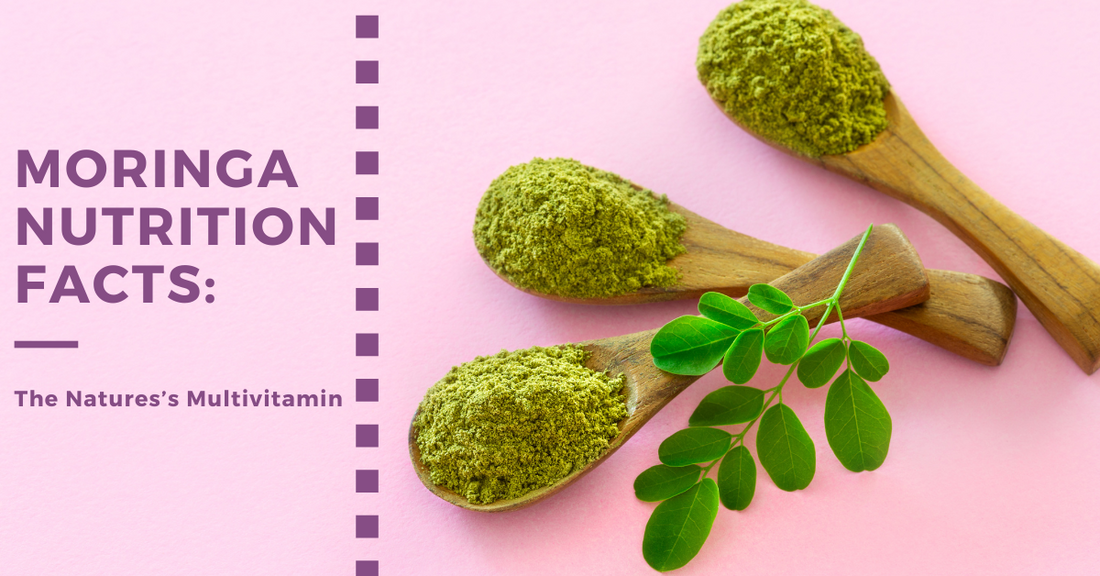
Moringa Nutrition Facts: What You Need to Know About Nature’s Multivitamin
Share
Moringa is sometimes called the miracle tree. It is truly a treasure trove of nutrients that can transform your health. With its rich profile of nutrients, moringa is packed with essential vitamins, minerals, and antioxidants that your body craves. From improving energy levels to boosting immunity, ignoring these moringa nutrition facts is hard. Whether you want to fortify your bones, enhance digestion, or just give your body wholesome nutrients, it's all there in moringa. The leaves, seeds, and pods are full of health benefits, so you'll find that it should be added to your daily diet.
It's a true marvel of nature in how incredibly versatile moringa is. You can add its powder to your smoothies, brew its leaves as tea, or cook with its oil, all the while taking in its enormous health benefits. Each time you eat or drink it, you are feeding your body the finest that nature has to offer. Learn more about moringa nutrition facts and why this superfood is gaining global recognition.
Table of Contents
Moringa Nutritional Value Chart
Here is a detailed Moringa Nutritional Value Chart based on 100 grams of moringa leaves (fresh and raw):
|
Nutrient |
Amount (per 100g) |
% Daily Value (approx.) |
|
Energy |
64 kcal |
3% |
|
Protein |
9.4 g |
19% |
|
Fat |
1.4 g |
2% |
|
Carbohydrates |
8.3 g |
3% |
|
Fibre |
2.0 g |
8% |
|
Vitamin A |
7564 IU |
252% |
|
Vitamin C |
51.7 mg |
86% |
|
Calcium |
185 mg |
18% |
|
Iron |
4.0 mg |
22% |
|
Magnesium |
42 mg |
11% |
|
Potassium |
337 mg |
10% |
|
Sodium |
9 mg |
<1% |
This chart highlights why moringa is considered a superfood. Its impressive levels of protein, calcium, and vitamin A make it ideal for supporting bone health, eye health, and overall wellness.
What Nutrients Are in Moringa?
Moringa is a powerhouse of essential nutrients. It has become known as a superfood due to its packed vitamins, minerals, and antioxidants. This would provide your body with the necessary nourishment to keep your body healthy. Whether you need to boost immunity, improve energy levels, or just generally have a healthy well-being, the moringa nutrition facts are pretty impressive.
Here's a quick rundown on the key nutrients in moringa:
- Protein builds and repairs tissues
- Vitamin A is for the eyes and skin.
- Vitamin C: Enhances immunity and helps fight infections.
- Calcium: Builds bones and teeth.
- Iron: Prevents anaemia and increases energy.
- Potassium: Helps in the functioning of the heart and muscles.
- Magnesium: Assists in muscle relaxation and energy production.
- Fiber: Encourages healthy digestion.
- Antioxidants: Prevent cell damage and ageing.
With all these nutrients, moringa is indeed nature's gift to your health.
Vitamins and Minerals in Moringa

Moringa is a nutrient-dense superfood, providing the body with an abundance of essential vitamins and minerals. Hence, it makes a great supplement to your diet. The impressive moringa nutrition facts reveal the ability of the superfood to nourish your body with the key nutrients needed for overall health and vitality.
Here is a list of the vitamins and minerals in moringa:
- Vitamin A: Improves vision, boosts immunity, and creates healthy skin.
- Vitamin C: Boosts the immune system and maintains collagen.
- Vitamin E: Protects cells against damage and helps in keeping the skin healthy.
- Calcium: Builds strong bones and teeth.
- Iron: Prevents fatigue due to increasing oxygen levels in the body.
- Potassium: It helps in regulating blood pressure and improving muscle function.
- Magnesium: Reduces stress and results in better sleep.
- Zinc: Boosts healing of wounds and enhances immunity.
The richness of all these vitamins and minerals in moringa makes it a complete nutritional package for daily wellness.
Health Benefits of Moringa Leaves
Moringa leaves have a high concentration of nutrients and antioxidants, providing lots of health benefits. Indeed, the impressive moringa nutrition facts make leaves a natural remedy for lots of health concerns. These are the key benefits listed below:
- Boosts Immunity: High in vitamins A and C, moringa enhances the immune system.
- Improves Digestion: Rich in fibre, it promotes a healthy gut and prevents constipation.
- Supports Bone Health: Calcium and magnesium enhance bone strength and density.
- Boosts Energy Levels: Its iron levels fight off fatigue and enhance stamina.
- Regulates Blood Sugar: Helps in glucose level regulation, which further supports diabetes management.
- Supports Healthy Skin: Its antioxidants and vitamin E will protect the skin from ageing and damage.
- Helps in Weight Loss: Low-calorie, nutrient-dense, and helps manage weight.
- Helps to Keep the Heart Healthy: Potassium and antioxidants lower blood pressure and help in maintaining healthy heart functions.
Adding the moringa leaves to your diet can work wonders for your overall health.
Calories and Protein in Moringa
Moringa is a low-calorie superfood that is rich in protein, which makes it the best choice for those seeking a balanced diet. The nutrition facts of moringa reveal that its leaves offer a healthy energy boost that supports muscle repair and growth. With only 64 calories per 100 grams, moringa is ideal for weight management and overall wellness.
Here's what you need to know about the calories and protein in moringa:
- Low in Calories: Contains only 64 calories per 100 grams, excellent for weight-conscious diets.
- High in Protein: With 9.4 grams of high-quality protein per 100 grams, it supports muscle growth.
- Complete Protein: This is a source of all nine amino acids that the body needs.
- Ideal for Vegans: A plant-based protein that's an excellent addition to vegan and vegetarian diets.
- Energy Enhancer: Protein content helps sustain energy throughout the day.
Moringa is the perfect blend of low-calorie and high-protein to fuel your body naturally.
Moringa vs Other Superfoods

When comparing the nutrition facts of moringa with other popular superfoods, it is no wonder that moringa is indeed a powerhouse. Here is how moringa stands:
- Moringa vs. Kale
Moringa has 7 times the vitamin C content of kale.
Double the protein of kale is provided per serving
- Moringa vs. Spinach
Moringa has 25 times more iron than spinach for anaemia prevention.
More calcium for stronger bones
- Moringa vs. Matcha
Moringa has more antioxidants, reducing inflammation and slowing ageing.
Unlike matcha, moringa has no caffeine, so one can use it throughout the day.
- Moringa vs Quinoa:
Moringa has a better protein profile with all the essential amino acids.
It is lower in calories, helping in managing weight.
Moringa scores over many superfoods for its rich nutrient profile, which makes it a better fit for health-conscious people.
Frequently Asked Questions
How Many Vitamins Are in Moringa?
Moringa contains, in short, vitamin C (51.70 mg | 57% DV). 0.66 mg of riboflavin (51% DV) vitamin B6 (71% DV; 1.20 mg) vitamin A (42% DV; 378.00 mcg) Zeaxanthin with lutein (26100.00 mcg) iron (22% DV; 4.00 mg) manganese (46% DV; 1.06 mg) Another name for Moringa (Moringa oleifera) is malunggay, or drumstick tree.
Is Moringa High in Calcium?
Because moringa leaves are high in protein, calcium, potassium, iron, and vitamins A, C, and B6, they are utilized as supplemental foods to breast milk when nursing babies. Methods and Design: Three formulas were used to create instant porridge.
What Are the Antioxidants in Moringa?
Because Moringa oleifera contains a variety of chemicals, including ascorbic acid, flavonoids, phenolics, and carotenoids, it exhibits intriguing antioxidant activity and functions as a good source of antioxidants.
Is Moringa Good for Weight Loss?
Extract from moringa seeds may help control several obesity-related issues. One potential advantage is that it can help with weight loss. avoiding inflammation.
Can Moringa Help with Deficiencies?
As an alternative to iron pills, moringa powder can be used to treat anaemia. Moringa leaf powder has 28 mg of iron, whereas beef only contains 2 mg. According to some reports, moringa has a higher iron content than spinach.
